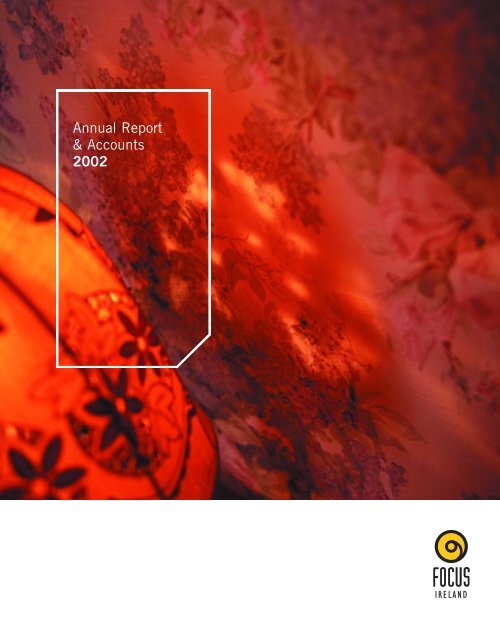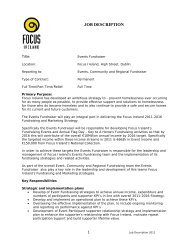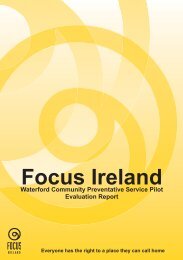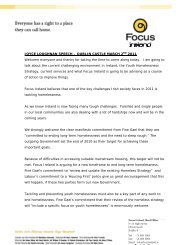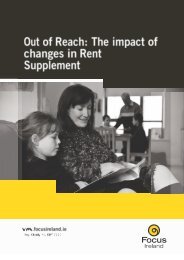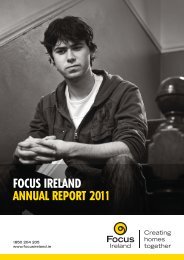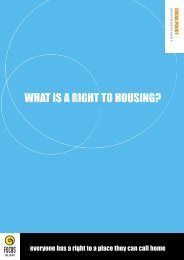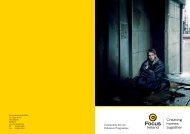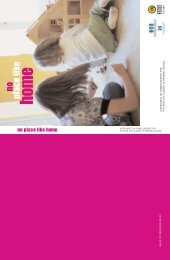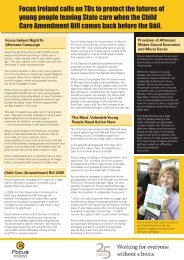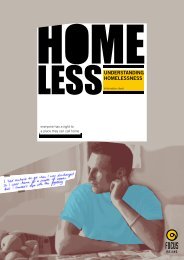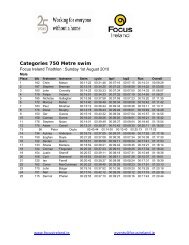Download the 2002 Annual report here - Focus Ireland
Download the 2002 Annual report here - Focus Ireland
Download the 2002 Annual report here - Focus Ireland
Create successful ePaper yourself
Turn your PDF publications into a flip-book with our unique Google optimized e-Paper software.
<strong>Annual</strong> Report<br />
& Accounts<br />
<strong>2002</strong><br />
IRELAND
CONTENTS<br />
Introduction 02<br />
Chief Executive’s Address 04<br />
A world from Sr Stanislaus Kennedy,<br />
Life President of <strong>Focus</strong> <strong>Ireland</strong> 05<br />
Meeting <strong>the</strong> Need 07<br />
* The First Port of Call 11<br />
* Reaching our Homeless Youth 15<br />
* Families in <strong>Focus</strong> 25<br />
* Moving On 33<br />
* At Home 37<br />
<strong>Focus</strong> <strong>Ireland</strong> Research, Development and Education 43<br />
Fundraising 47<br />
Investing in our staff 51<br />
New in 2003 55<br />
<strong>Focus</strong> <strong>Ireland</strong> accounts 59<br />
have kindly supported <strong>the</strong> printing of this <strong>report</strong>
FOCUS IRELAND is one of <strong>the</strong> leading non-profit agencies<br />
in <strong>Ireland</strong> working with people who are homeless or at risk<br />
of homelessness. Founded by Sr. Stanislaus Kennedy in<br />
1985, <strong>Focus</strong> <strong>Ireland</strong> has both proposed solutions and<br />
provided practical responses in <strong>the</strong> area of homelessness.<br />
Originally Dublin based, <strong>Focus</strong> <strong>Ireland</strong> now has projects in<br />
both Limerick and Waterford.<br />
MISSION: <strong>Focus</strong> <strong>Ireland</strong> aims to advance <strong>the</strong> rights of<br />
people out-of-home to live in a place <strong>the</strong>y call home<br />
through quality services, research and advocacy.<br />
VISION: <strong>Focus</strong> <strong>Ireland</strong> believes that everyone has <strong>the</strong><br />
right to a place <strong>the</strong>y can call home.<br />
Values<br />
<strong>Focus</strong> <strong>Ireland</strong>’s models of service<br />
provision are dictated by <strong>the</strong> needs<br />
of our customers. We believe <strong>the</strong><br />
quality of service delivery is as<br />
important as <strong>the</strong> kind of services we<br />
provide. T<strong>here</strong> are eight primary<br />
values that underpin our models of<br />
service delivery, both to our staff and<br />
our customers:<br />
- respect<br />
- safety<br />
- accessibility<br />
- empowerment<br />
- stewardship<br />
- quality<br />
- partnership<br />
- integration<br />
Objectives<br />
<strong>Focus</strong> <strong>Ireland</strong>’s objectives are to:<br />
- respond to <strong>the</strong> needs of people<br />
out-of-home and those at risk of<br />
becoming homeless, through a<br />
range of appropriate high<br />
quality services<br />
- provide emergency, transitional<br />
and long-term accommodation<br />
- campaign and lobby for <strong>the</strong> rights<br />
of people-out-of home and <strong>the</strong><br />
prevention of homelessness<br />
02
Trustees<br />
Sr Marie Helen Hicks<br />
Mr Dermot Hussey<br />
Mr Donal Nevin<br />
Directors<br />
Sr Stanislaus Kennedy,<br />
Life President, <strong>Focus</strong> <strong>Ireland</strong><br />
Dr Edmond Molloy** (Chairman)<br />
Mr Tim Bouchier-Hayes<br />
Mr Desmond Byrne*<br />
Ms Trudi Devereux<br />
Mr Patrick Griffin**<br />
Mr Edward McCumiskey<br />
Mr Patrick Mooney*<br />
Dr Patricia O’Hara<br />
Dr Bairbre Redmond*<br />
Dr Valerie Richardson<br />
Mr Larry Tuomey*<br />
Mr Mat<strong>the</strong>w Walsh**<br />
Chief Executive<br />
Mr Declan Jones<br />
Secretary<br />
Ms Evelyn Fitzpatrick<br />
Registered office<br />
14a Eustace St, Dublin 2<br />
Auditors<br />
Phelan, Prescott & Co,<br />
Chartered Accountants<br />
and Registered Auditors<br />
Solicitors<br />
Arthur Cox<br />
Ferry Solicitors<br />
Principal Bankers<br />
Bank of <strong>Ireland</strong><br />
Allied Irish Banks plc<br />
Bank of Scotland<br />
Registered Charity No<br />
CHY 7220<br />
*<br />
**<br />
retired during <strong>2002</strong><br />
retired in accordance with <strong>the</strong><br />
Articles of Association and<br />
were re-elected to <strong>the</strong> board.<br />
03
Foreword<br />
<strong>Focus</strong> <strong>Ireland</strong> has a proud track record of<br />
both understanding and explaining <strong>the</strong><br />
problem of homelessness as well as<br />
demonstrating how services can be<br />
developed to support and enable people to<br />
improve and change <strong>the</strong>ir circumstances.<br />
In this context, it is dispiriting to<br />
introduce ano<strong>the</strong>r annual <strong>report</strong> with a<br />
litany of facts and figures that question<br />
our ability and commitment as a society<br />
to addressing <strong>the</strong> needs of our most<br />
excluded. It is clear <strong>the</strong> problem of<br />
homelessness is a structural one.<br />
Housing waiting lists have shot up 24%<br />
from 39,000 in 1999 to a current<br />
record high of 48,413 households.<br />
That’s a staggering total of nearly<br />
140,000 men, women and children who<br />
don’t have a proper place to call home.<br />
Last year <strong>the</strong> Government admitted it<br />
will not meet its housing commitments<br />
under <strong>the</strong> PPF to provide 25,000 new<br />
house starts from 2000-2003. This<br />
means <strong>the</strong> housing waiting lists will<br />
continue to grow unchecked and people<br />
will have to wait even longer before<br />
being housed.<br />
It is <strong>the</strong>refore no surprise that people<br />
who are homeless remain so for longer<br />
than ever before, while <strong>the</strong> numbers of<br />
people without a home continue to rise.<br />
<strong>Focus</strong> <strong>Ireland</strong>’s recent experience is<br />
worrying. The nature of <strong>the</strong> damage and<br />
needs we are encountering in our work is<br />
more profound and more difficult to<br />
engage and resolve than before.<br />
We in <strong>Focus</strong> <strong>Ireland</strong> have continued to<br />
learn from our customers’ experiences<br />
and needs and have sought to raise<br />
awareness and understanding of <strong>the</strong>ir<br />
ongoing issues and evolving needs with<br />
<strong>the</strong> general public and directly with <strong>the</strong><br />
agencies and authorities who are in a<br />
position to drive meaningful structural<br />
change. <strong>Focus</strong> <strong>Ireland</strong>’s unique value<br />
continues to be our willingness and<br />
ability to engage our clients in <strong>the</strong> whole<br />
range of <strong>the</strong>ir needs and to do so in a<br />
manner that achieves an impact in <strong>the</strong>ir<br />
life and a change in <strong>the</strong>ir circumstances.<br />
We know <strong>the</strong> problems and <strong>the</strong> issues<br />
and are learning, along with our clients,<br />
how to create solutions to <strong>the</strong>se same<br />
issues and problems. However,<br />
organisations like <strong>Focus</strong> <strong>Ireland</strong> will<br />
never be able to solve <strong>the</strong>se problems<br />
alone. The type of services and housing<br />
provided by <strong>Focus</strong> <strong>Ireland</strong> need to be<br />
replicated on a larger scale to respond<br />
properly to this growing crisis. Only <strong>the</strong>n<br />
can we say we’re on our way to living in<br />
a society proud to include everyone and<br />
not one which continues to exclude its<br />
most marginalized people.<br />
Our <strong>Annual</strong> Report represents some of<br />
our efforts over <strong>the</strong> past year in<br />
developing our client support and<br />
housing services to continue identifying<br />
and responding to gaps in existing<br />
services. I am immensely proud of <strong>Focus</strong><br />
<strong>Ireland</strong>’s work and commend it to you.<br />
Given <strong>the</strong> circumstances within which<br />
we work of more profound needs on a<br />
greater scale, and with funding required<br />
by organisations like <strong>Focus</strong> <strong>Ireland</strong> being<br />
cut, I am particularly proud that we have<br />
continued to innovate and harness<br />
greater support and resolve.<br />
On behalf of <strong>Focus</strong> <strong>Ireland</strong> - Thank you.<br />
Declan Jones<br />
Chief Executive<br />
04
A Word from Sr Stanislaus Kennedy, Life President<br />
Finding (and keeping) a home is a<br />
complex and competitive business, which<br />
demands a clear mind, a high degree of<br />
responsibility – and money. This complex<br />
and expensive business has become even<br />
more difficult in <strong>the</strong> competitive, highly<br />
priced <strong>Ireland</strong> of today, and it is not<br />
surprising that more and more people are<br />
finding that <strong>the</strong>y can’t manage it. The<br />
result is a growing homeless population,<br />
representing people from all social levels.<br />
Irish governments have always had<br />
housing policies that encouraged home<br />
ownership for <strong>the</strong> middle classes; in <strong>the</strong><br />
past, <strong>the</strong>se policies were complemented<br />
by a policy of providing housing for those<br />
who could not hope to own <strong>the</strong>ir own<br />
homes, and so we had local authority<br />
housing developments being built right<br />
up through <strong>the</strong> middle and into <strong>the</strong> later<br />
part of <strong>the</strong> twentieth century. But it<br />
seems that in recent decades we have<br />
abandoned <strong>the</strong> historic policy of<br />
provision of social housing for those who<br />
cannot afford to house <strong>the</strong>mselves. Local<br />
authority housing for rent now comprises<br />
only 9% of <strong>the</strong> total housing stock,<br />
compared with 20% during <strong>the</strong> 1960s.<br />
This decline in public housing has been<br />
accompanied by a decline in <strong>the</strong> private<br />
rented sector, from 42% of housing<br />
stock in 1946 to less than 11% today.<br />
The effect of this, along with <strong>the</strong> rise in<br />
house values, has had <strong>the</strong> effect of<br />
pushing rents beyond <strong>the</strong> reach of<br />
people on low incomes.<br />
T<strong>here</strong> is now a sizeable portion of our<br />
population who are not eligible for public<br />
housing and yet cannot afford ei<strong>the</strong>r to<br />
buy or to rent in <strong>the</strong> private sector. T<strong>here</strong><br />
is also a sizeable portion of our<br />
population who are eligible for public<br />
housing but who cannot access it<br />
because it is simply not available. The<br />
housing waiting list has almost trebled in<br />
<strong>the</strong> last 15 years. This is nothing short<br />
of disgraceful coming as it does after<br />
almost 15 years of unprecedented levels<br />
of economic growth and<br />
budget surpluses.<br />
What are <strong>the</strong> people on <strong>the</strong>se housing<br />
lists supposed to do while <strong>the</strong>y wait<br />
Low-rent accommodation is scarce, and,<br />
when faced with <strong>the</strong> choice between<br />
spending most of <strong>the</strong>ir limited funds on<br />
rent and having something to spend on<br />
food, many people are forced to choose<br />
food. This is w<strong>here</strong> our homeless<br />
population comes from: homeless people<br />
are people whom <strong>the</strong> local authorities<br />
cannot or will not or at any rate do not<br />
house, and who cannot afford to house<br />
<strong>the</strong>mselves and eat as well.<br />
A home is a basic human right and I<br />
believe a home should be a constitutional<br />
right. Until we as a nation see that this is<br />
so and acknowledge that this is so and<br />
demand of our politicians and our policymakers<br />
that <strong>the</strong>y accept this and act on<br />
this premise, we will never tackle <strong>the</strong><br />
problem of homelessness. Until our<br />
policy-makers have <strong>the</strong> imagination and<br />
above all <strong>the</strong> courage to acknowledge <strong>the</strong><br />
structural and root causes of this housing<br />
crisis and <strong>the</strong>y have <strong>the</strong> commitment and<br />
political will to remove all and any of<br />
<strong>the</strong>se causes <strong>the</strong> housing waiting lists<br />
will not be eliminated and homelessness<br />
will not be reduced.<br />
Stanislaus Kennedy<br />
Life President<br />
05
Meeting <strong>the</strong> need<br />
07
OUT OF HOME<br />
>><br />
APPROPRIATE SERVICES<br />
AND SUPPORT<br />
>><br />
A PLACE CALLED HOME<br />
from <strong>the</strong> vulnerable single person<br />
who needs supported housing.<br />
For this reason, <strong>Focus</strong> <strong>Ireland</strong> offers a<br />
range of specifically targeted services,<br />
in particular for young people under<br />
25, and for families, to help people<br />
deal with, and overcome <strong>the</strong> particular<br />
issues that affect <strong>the</strong>ir lives.<br />
It is <strong>the</strong> core belief of <strong>Focus</strong> <strong>Ireland</strong><br />
that everyone has a right to a place<br />
<strong>the</strong>y can call home and we work on a<br />
daily basis to help try and make this<br />
a reality for people who are<br />
experiencing homelessness.<br />
Homelessness is a complex problem<br />
and cannot always be solved by<br />
simply providing a roof over<br />
somebody’s head. Many people who<br />
are homeless may have a wide range<br />
of issues and problems to deal with<br />
in <strong>the</strong>ir lives which add to what is an<br />
already highly-stressful situation for<br />
<strong>the</strong>m. The needs of different kinds of<br />
people who find <strong>the</strong>mselves<br />
homeless, or at risk of being so, also<br />
vary considerably. For example, <strong>the</strong><br />
needs of a teenager sleeping rough<br />
on <strong>the</strong> streets are quite distinct from<br />
those a family living in a B & B, or<br />
<strong>Focus</strong> <strong>Ireland</strong> also aims to offer a<br />
continuum of care. Many of our<br />
services are interlinked in order to<br />
help people move through <strong>the</strong> stages<br />
of homelessness, by offering<br />
different levels of help and support<br />
according to what a person needs at<br />
a particular moment in <strong>the</strong>ir lives.<br />
The following pages detail how our<br />
service plan works, from our Coffee<br />
Shop and Crisis Desk which is often<br />
<strong>the</strong> first port of call when a person<br />
finds <strong>the</strong>mselves homeless, through<br />
targeted services for homeless young<br />
people and homeless families, through<br />
<strong>the</strong> provision of medium term<br />
accommodation and development<br />
programmes, to <strong>the</strong> final goal of<br />
settlement, ei<strong>the</strong>r in one of our own<br />
supported housing projects or in<br />
<strong>the</strong> community.<br />
08
Meeting <strong>the</strong> need<br />
The first port of call
12<br />
FOR ME, FOCUS IRELAND<br />
WAS LIKE BEING THROWN<br />
A LIFE-LINE. 52 year old<br />
Claire eventually found a<br />
home with <strong>the</strong> help of<br />
<strong>Focus</strong> <strong>Ireland</strong>.
THE FOCUS IRELAND COFFEE<br />
SHOP AND HOUSING ADVICE<br />
CENTRE<br />
The Coffee Shop is perhaps <strong>the</strong> best<br />
known of <strong>Focus</strong> <strong>Ireland</strong>’s many<br />
services. It has been <strong>the</strong> focal point<br />
of <strong>the</strong> organisation over <strong>the</strong> years,<br />
since it first opened its doors back in<br />
1985 right in <strong>the</strong> heart of Temple Bar<br />
in Dublin. It has a welcoming social<br />
environment w<strong>here</strong> people who are<br />
out-of-home can get snacks and good<br />
quality hot meals at a very reasonable<br />
price. The service is open to adults<br />
over 18 years of age and to families.<br />
It is a vital service as it can be hard<br />
for individuals and families to keep<br />
up a regular healthy diet when <strong>the</strong>y<br />
have no permanent home or place to<br />
stay. It also acts as our central<br />
referral point. Staff refer customers to<br />
o<strong>the</strong>r <strong>Focus</strong> <strong>Ireland</strong> services and to<br />
o<strong>the</strong>r relevant services.<br />
The Coffee Shop extended its service<br />
from five to seven days in <strong>2002</strong> as a<br />
direct response to a growing demand<br />
from our customers. Its opening<br />
hours during <strong>the</strong> week were also<br />
extended and it now opens from<br />
10am until 5.30pm from Monday<br />
through to Friday. T<strong>here</strong> is an<br />
extended lunchtime during <strong>the</strong> week<br />
with hot lunch being served between<br />
12 noon and 3pm. T<strong>here</strong> are also<br />
social and educational activities held<br />
for adults during <strong>the</strong> afternoon. The<br />
service had more than 2,600<br />
customers in <strong>2002</strong>.<br />
Brendan Cunningham, Project<br />
Leader of <strong>the</strong> Coffee Shop said: "Our<br />
customers are ei<strong>the</strong>r living on <strong>the</strong><br />
streets or in unsuitable emergency<br />
accommodation w<strong>here</strong> <strong>the</strong>y have no<br />
cooking facilities so it’s important<br />
that <strong>the</strong>y have somew<strong>here</strong> <strong>the</strong>y can<br />
get quality food which <strong>the</strong>y can<br />
afford on a seven-day basis. You see<br />
a lot of <strong>the</strong> same people coming in<br />
every day - single men, women and<br />
families. Many of <strong>the</strong>m depend on<br />
this service. It helps give <strong>the</strong>ir day<br />
some solid structure as its<br />
somew<strong>here</strong> <strong>the</strong>y are welcome and<br />
not somew<strong>here</strong> <strong>the</strong>y are being moved<br />
on from. We’re <strong>here</strong> to help but<br />
sometimes it may be just as helpful<br />
for <strong>the</strong>m to see a friendly face and<br />
have someone to talk to about what’s<br />
going on in <strong>the</strong>ir life."<br />
THE CRISIS TEAM<br />
Based on site in <strong>the</strong> Coffee Shop, <strong>the</strong><br />
Crisis Team is accessible to help<br />
people who need advice and<br />
information on specific issues, such<br />
as housing, health and social welfare<br />
entitlements. The team also provides<br />
ongoing individual support to people,<br />
advocating on <strong>the</strong>ir behalf with local<br />
authorities and health services, and<br />
supporting <strong>the</strong>m during <strong>the</strong>ir period<br />
of homelessness to help <strong>the</strong>m find<br />
solutions to change <strong>the</strong>ir situation.<br />
In <strong>2002</strong> <strong>the</strong> Crisis team helped<br />
771 people.<br />
13
Meeting <strong>the</strong> need<br />
Reaching our Homeless Youth
BY TREATING PEOPLE<br />
WITH RESPECT AND<br />
DIGNITY, BY GIVING<br />
THEM A HUMAN FACE,<br />
YOU CAN OFFER HOPE<br />
AND STABILITY.<br />
Outreach Team Member.<br />
<strong>Focus</strong> <strong>Ireland</strong> is a leading provider<br />
of services for homeless young<br />
people. In <strong>2002</strong> we provided help<br />
for 1,382 young people aged 12 –<br />
25 through a wide range of projects<br />
and initiatives.<br />
THE OUTREACH TEAM works on <strong>the</strong><br />
streets seven days and nights a<br />
week, meeting young people<br />
sleeping rough on Dublin’s streets.<br />
They work to develop trusting<br />
relationships with <strong>the</strong> people <strong>the</strong>y<br />
come in contact with, offering<br />
practical help and linking <strong>the</strong>m to<br />
services to help <strong>the</strong>m move out of<br />
<strong>the</strong>ir current situation.<br />
In <strong>2002</strong> <strong>the</strong> Outreach Team met<br />
897 individuals and 56% of <strong>the</strong>se<br />
were under 26 years of age.<br />
THE LOFT is a day centre for young<br />
people under 18 year’s of age. It is<br />
open seven days a week and<br />
provides a safe environment away<br />
from <strong>the</strong> streets w<strong>here</strong> young people<br />
can eat, shower and participate in<br />
recreational and educational<br />
activities. Staff liase with health<br />
boards to ensure that each young<br />
person is moved from <strong>the</strong> dangers of<br />
<strong>the</strong> street scene as quickly as<br />
possible. 136 young people used <strong>the</strong><br />
Loft in <strong>2002</strong><br />
THE EXTENSION is a day centre for<br />
young people aged between 18 and<br />
25 year’s old who are homeless. It<br />
provides practical facilities including<br />
showers, laundry and cooking facilities.<br />
Staff help customers to identify <strong>the</strong>ir<br />
needs, provide <strong>the</strong>m with support and<br />
also advocate with o<strong>the</strong>r organisations<br />
on <strong>the</strong>ir behalf. 200 people came to<br />
<strong>the</strong> Extension in <strong>2002</strong>.<br />
16
OFF-THE-STREETS IS THE<br />
BEST HOSTEL. STAFF<br />
COMMUNICATE WITH<br />
YOU. THE ATMOSPHERE<br />
IS HOMELIKE.<br />
Past resident, OTS.<br />
THE YOUNG WOMEN’S AFTERCARE<br />
PROJECT offers transitional<br />
accommodation to young women who<br />
have left State care or who have<br />
experienced street homelessness. Staff<br />
provide support to <strong>the</strong> young women<br />
living in <strong>the</strong> project and after <strong>the</strong>y<br />
move on to independent living. Four<br />
young women made <strong>the</strong>ir home <strong>here</strong><br />
in <strong>2002</strong><br />
OFF-THE-STREETS - young people<br />
aged between 16 and 18 are<br />
provided with residential and<br />
emergency accommodation.<br />
90 young people stayed in Off <strong>the</strong><br />
Streets in <strong>2002</strong><br />
AFTER-CARE PROGRAMMES -<br />
residential support is provided in our<br />
Stanhope Green, Limerick and<br />
Waterford projects to young people<br />
who have left State care and want to<br />
pursue training or education<br />
programmes. A total of 14 young<br />
people who had left care called<br />
<strong>Focus</strong> <strong>Ireland</strong> home in <strong>2002</strong><br />
SPOKES PROGRAMME - offers<br />
training and preparation for work skills.<br />
19
The Extension Drop-in Centre<br />
Opens Seven Days<br />
<strong>Focus</strong> <strong>Ireland</strong> has been witnessing<br />
<strong>the</strong> phenomenon of youth<br />
homelessness for over a decade. We<br />
continuously review, alter and<br />
expand our services in response to<br />
<strong>the</strong> changing situations and needs of<br />
young people who are homeless. A<br />
key development at <strong>the</strong> end of <strong>2002</strong><br />
saw <strong>the</strong> expansion of our Extension<br />
Drop-in Centre, serving 18 – 25 year<br />
olds, from five days to seven days a<br />
week. Week-day hours also<br />
increased from five mornings and<br />
three afternoons to opening from<br />
10.30 am to 6.30 pm every day.<br />
Accompanying <strong>the</strong> change in<br />
opening hours is a shift in emphasis<br />
of <strong>the</strong> project. Over recent years our<br />
Street Outreach Team has seen a<br />
significant increase in <strong>the</strong> numbers<br />
of severely marginalised young<br />
people <strong>the</strong>y are working with.<br />
Increasing and changing drug use<br />
has heightened <strong>the</strong> chaotic<br />
circumstances of young people<br />
sleeping rough, making it impossible<br />
for <strong>the</strong>m to access most of <strong>the</strong><br />
services that could help <strong>the</strong>m<br />
change <strong>the</strong>ir situation. The<br />
Extension now primarily services<br />
contacts referred by <strong>the</strong> Outreach<br />
Team. It has become a specialised<br />
unit serving <strong>the</strong> needs of <strong>the</strong> most<br />
marginalised young homeless people<br />
in society. This change in emphasis<br />
has brought about a number of<br />
significant developments.<br />
The Extension traditionally served<br />
around 15 people a day. However,<br />
since December <strong>2002</strong> up to 60<br />
young people access <strong>the</strong> centre in<br />
any one day. Staff numbers have<br />
risen accordingly to meet this extra<br />
demand. The whole approach of <strong>the</strong><br />
service has changed to become more<br />
flexible. All policies are aimed at<br />
helping change behaviour, ra<strong>the</strong>r<br />
than punishing behaviour. Sanctions<br />
such as barring are used as little as<br />
possible.<br />
The work has become very<br />
individualised to deal with <strong>the</strong> very<br />
specific needs of each customer, with<br />
less of a focus on group work and<br />
group activities than previously. "It is<br />
a long journey for <strong>the</strong>se young<br />
people," says Fiona Lorden, manager<br />
of <strong>the</strong> service. "But even in <strong>the</strong> short<br />
time since <strong>the</strong> shift in emphasis, <strong>the</strong><br />
small incremental steps that people<br />
need to make seem to take a little<br />
less time. The change in <strong>the</strong> service<br />
means that <strong>the</strong> most marginalised<br />
young people can access services that<br />
were not available to <strong>the</strong>m before."<br />
20
The Spokes Programme Opens<br />
In February <strong>2002</strong>, <strong>the</strong> Drugs Task<br />
Force provided funding to establish a<br />
pilot ‘Preparation for Work’ programme<br />
to offer homeless young people <strong>the</strong><br />
opportunity to gain qualifications and<br />
practical skills to enable <strong>the</strong>m to gain<br />
employment. Based in <strong>the</strong> Extension<br />
and accredited by <strong>the</strong> Fur<strong>the</strong>r<br />
Education and Awards Council,<br />
courses are offered in Maths, English<br />
and Communication, Computer<br />
Literacy, preparation for work as well<br />
as an introduction to kayaking and<br />
outdoor pursuits.<br />
Spokes is a different kind of<br />
‘classroom’, allowing participants to<br />
use <strong>the</strong> programme at whatever level<br />
<strong>the</strong>y are ready for. Young people can<br />
drop into <strong>the</strong> Spokes room to use<br />
<strong>the</strong> computer, job search, surf <strong>the</strong><br />
net or simply have a chat. This<br />
informal approach is designed to<br />
encourage people to use <strong>the</strong><br />
facilities and allows <strong>the</strong>m build<br />
confidence to participate more fully.<br />
When a client is ready staff discuss<br />
<strong>the</strong>ir needs with <strong>the</strong>m and working<br />
toge<strong>the</strong>r <strong>the</strong>y develop a customised<br />
plan. This can include completing a<br />
FETAC module at <strong>the</strong>ir own pace in<br />
<strong>the</strong> Spokes programme, or linking<br />
<strong>the</strong>m to appropriate courses within<br />
<strong>the</strong> community. During <strong>2002</strong> a<br />
number of participants attended<br />
Colaiste Ide in Finglas to study and<br />
gain a European Computer Driving<br />
License. This provided <strong>the</strong> added<br />
benefit of allowing <strong>the</strong>m experience<br />
<strong>the</strong> environs of a third level college,<br />
building <strong>the</strong>ir confidence and<br />
providing a positive experience of<br />
formal education.<br />
A fur<strong>the</strong>r element of Spokes comes via<br />
<strong>the</strong> ESB Core Programme, which<br />
provides funding for courses for<br />
individual young people appropriate to<br />
<strong>the</strong>ir particular needs. These include<br />
fork-lift driving courses, computer<br />
skills, driving lessons etc. Business in<br />
<strong>the</strong> Community has also been a<br />
valuable support, with some Spokes<br />
participants gaining employment<br />
places with Marks & Spencer as part<br />
of <strong>the</strong>ir involvement.<br />
Spokes started as a small programme<br />
and was attended by 25 participants<br />
in <strong>2002</strong>. The agency has recognised<br />
its potential and hopes to continue<br />
and grow <strong>the</strong> programme after <strong>the</strong><br />
pilot is completed.<br />
European Funding Provides<br />
Computer Access for Young People<br />
This programme assists young<br />
customers develop <strong>the</strong>ir skills was<br />
established in <strong>2002</strong> as part of Project<br />
Hermes, a European Programme<br />
whose aim is to introduce Information<br />
Communication Technology (ICT) to<br />
marginalised groups. The programme<br />
was launched by <strong>Focus</strong> <strong>Ireland</strong> in<br />
March along with projects in Denmark,<br />
Holland and <strong>the</strong> UK. Computers,<br />
training and internet access were<br />
provided to customers using our Loft,<br />
Extension and Outreach services. It is<br />
hoped that this programme will<br />
empower socially excluded groups<br />
through <strong>the</strong> use of information<br />
techology. Participants will have an<br />
opportunity in 2003 to discuss <strong>the</strong>ir<br />
experiences at a conference of all<br />
participating countries.<br />
23
Meeting <strong>the</strong> need<br />
Families in <strong>Focus</strong>
26<br />
I’VE BEEN LIVING HERE<br />
FOR NEARLY TWO YEARS<br />
NOW AND I’M NO NEARER<br />
GETTING A PROPER<br />
HOUSE. IT’S NO PLACE TO<br />
BE BRINGING UP KIDS,<br />
THEY’VE NOWHERE TO<br />
PLAY AND THERE’S NO<br />
KIDS THEIR AGE LIVING<br />
HERE. IT’S DOING MY<br />
HEAD IN LIVING LIKE THIS.<br />
IT TAKES A TERRIBLE TOLL<br />
ON THE WHOLE FAMILY.<br />
Danny, 32, living in B & B<br />
emergency accommodation<br />
in Dublin with his partner<br />
and two young children.
In <strong>2002</strong>, as in previous years, <strong>the</strong><br />
tragedy of family homelessness<br />
continued to be a major issue<br />
confronting <strong>Focus</strong> <strong>Ireland</strong>.<br />
The practice of using emergency Bed<br />
and Breakfast accommodation to<br />
house families in crisis situations<br />
showed little sign of abating despite<br />
recurring calls on government by<br />
<strong>Focus</strong> <strong>Ireland</strong> and o<strong>the</strong>r members of<br />
<strong>the</strong> voluntary sector to cease this<br />
form of accommodation which is<br />
highly inappropriate to family life<br />
and extremely detrimental to <strong>the</strong><br />
health and wellbeing of both children<br />
and parents.<br />
During <strong>2002</strong> our services found<br />
<strong>the</strong>mselves working with families who<br />
are spending hugely increased periods<br />
of time in B & B accommodation; it is<br />
now common for families to be<br />
housed this way for eighteen months<br />
or more. This phenomenon is<br />
impacting on all services, for example<br />
<strong>the</strong> <strong>Focus</strong> <strong>Ireland</strong> Childcare Centre in<br />
Johns Lane West saw a number of<br />
children who spent over a year<br />
attending <strong>the</strong> Centre, a service<br />
designed as an emergency resource<br />
during <strong>the</strong> weeks or a few months a<br />
family was homeless.<br />
27
THE FAMILY PROGRAMME - is a<br />
drop-in, weekday morning service for<br />
families. The programme runs a<br />
number of activities for parents and<br />
provides a crèche for children.<br />
Sponsorship from AIB has facilitated<br />
<strong>the</strong> addition of <strong>the</strong> Schoolmate<br />
Programme which aims to keep <strong>the</strong><br />
older children in school.<br />
CHILD CARE CENTRES - offer<br />
children time and space to play and<br />
meet <strong>the</strong>ir peers away from <strong>the</strong><br />
confines of B&Bs, emergency and<br />
transitional accommodation.<br />
Children are given a hot,mid-day<br />
meal and families have access to<br />
health professionals including GPs,<br />
Public Health Nurses and Speech<br />
and Language Therapists. In <strong>2002</strong>,<br />
our four Childcare Centres cared for<br />
201 children.<br />
ALYWARD GREEN in Finglas is <strong>the</strong><br />
first project in <strong>Ireland</strong> to offer<br />
purpose built emergency<br />
accomodation for families.<br />
TRANSITIONAL AND LONG TERM<br />
ACCOMMODATION - A total of 52<br />
adults & 87 children were living in<br />
homes in <strong>Focus</strong> <strong>Ireland</strong>’s long-term<br />
housing projects in <strong>2002</strong> while 29<br />
adults & 38 children participated in<br />
transitional housing programmes.<br />
28
Happy Birthday Aylward Green<br />
Aylward Green celebrated its first<br />
birthday in <strong>2002</strong>. A unique initiative,<br />
it is <strong>the</strong> first and, to date, only project<br />
in <strong>Ireland</strong> providing purpose built<br />
quality emergency accommodation for<br />
families who are homeless. The<br />
project has thirteen emergency two<br />
and three bedroom homes, as well as<br />
eleven long term homes.<br />
The families living in <strong>the</strong> emergency<br />
accommodation have mostly come<br />
from B&Bs and hostels. When<br />
families come to Aylward Green, staff<br />
in <strong>the</strong> project assess <strong>the</strong>ir needs and<br />
provide <strong>the</strong>m with appropriate<br />
support to help <strong>the</strong>m move on to<br />
independent living. Fundamental to<br />
<strong>the</strong> project however is <strong>the</strong><br />
involvement of <strong>the</strong> families<br />
<strong>the</strong>mselves in assessing <strong>the</strong>ir own<br />
needs. Staff asks participants to look<br />
at w<strong>here</strong> <strong>the</strong>y are, w<strong>here</strong> <strong>the</strong>y want to<br />
be, and what <strong>the</strong>y think is blocking<br />
<strong>the</strong>m. They need to examine why <strong>the</strong>y<br />
lost <strong>the</strong>ir home, and w<strong>here</strong> necessary<br />
accept responsibility for issues that<br />
may have contributed. Staff can <strong>the</strong>n<br />
aid <strong>the</strong>m address <strong>the</strong>se issues in<br />
order to move on.<br />
Children who have been homeless are<br />
hugely affected by <strong>the</strong> insecurity <strong>the</strong>y<br />
have known so programmes for <strong>the</strong>m<br />
are intrinsic to <strong>the</strong> project’s work. A<br />
breakfast club is provided for <strong>the</strong><br />
children before <strong>the</strong>y go to school, but<br />
<strong>the</strong> club is about more than just<br />
eating breakfast, it’s a place w<strong>here</strong><br />
young people can talk toge<strong>the</strong>r in a<br />
social setting, eat a nutritious<br />
breakfast and interact with staff.<br />
Homework clubs, holiday programmes<br />
and one to one work are provided, via<br />
<strong>the</strong> AIB Schoolmate Programme.<br />
Children enjoy <strong>the</strong> structure of <strong>the</strong><br />
project. It adds to <strong>the</strong>ir sense of self<br />
and <strong>the</strong>ir sense of security, something<br />
many would not have experienced in<br />
<strong>the</strong> past. For many of <strong>the</strong>m<br />
homelessness is about ‘loss’ - <strong>the</strong> loss<br />
of somew<strong>here</strong> to play, invite <strong>the</strong>ir<br />
friends, do <strong>the</strong>ir homework or simply a<br />
place <strong>the</strong>y can feel safe.<br />
All our staff and customers would<br />
agree that Aylward Green’s first year<br />
has been a resounding success but<br />
<strong>the</strong>re have certainly been problems<br />
with move-on accommodation which<br />
has resulted in many families<br />
staying for an average of six months.<br />
However, <strong>the</strong> bigger picture is about<br />
a longer term investment in families<br />
who o<strong>the</strong>rwise would have remained<br />
in a homeless situation longer and<br />
whose children would not have <strong>the</strong><br />
opportunities that many children<br />
take for granted.<br />
MARK’S STORY<br />
Mark was in his early twenties when his partner Jane gave birth to twin girls. He and Jane were living with Jane’s mo<strong>the</strong>r in<br />
a local authority house at <strong>the</strong> time <strong>the</strong> twins were born. Jane became terminally ill and only lived until her babies were 18<br />
months old. After her death Mark and Jane’s mo<strong>the</strong>r raised <strong>the</strong> children. Three years later Jane’s mo<strong>the</strong>r died leaving Mark<br />
alone with <strong>the</strong> twins. Because Mark had no succession rights to <strong>the</strong> house he was evicted by <strong>the</strong> local authority and went to<br />
live in emergency B&B accommodation with his twin daughters. Three months later <strong>the</strong> Homeless Persons Unit referred<br />
Mark to <strong>Focus</strong> <strong>Ireland</strong>’s Aylward Green project. He was given emergency housing and his children were linked with <strong>the</strong><br />
childcare facilities available at <strong>the</strong> project. Project staff supported Mark in his application for a secure home for himself and<br />
his children. Mark’s little girls are now five years old and are attending school, <strong>the</strong>y also attend <strong>the</strong> junior after school club in<br />
<strong>the</strong> project. Their school <strong>report</strong>s say <strong>the</strong>y are well balanced little girls. Mark was recently offered a local authority house<br />
back in his own community and is due to move in May 2003. He will be linked in with <strong>Focus</strong> <strong>Ireland</strong>’s Community<br />
Settlement Team who will help him make <strong>the</strong> move successfully.<br />
29
AIB Schoolmate Project<br />
In <strong>2002</strong> <strong>Focus</strong> <strong>Ireland</strong>’s AIB<br />
Schoolmate project was launched.<br />
The project forms part of AIB’s<br />
Better <strong>Ireland</strong> Programme, which<br />
supports <strong>the</strong> work of <strong>Focus</strong> <strong>Ireland</strong>,<br />
Barnardos and <strong>the</strong> ISPCC. It funds<br />
programmes designed to keep at-risk<br />
children in school. The emphasis is<br />
on targeting those who might<br />
o<strong>the</strong>rwise drop out of education<br />
because <strong>the</strong>ir families are affected<br />
by homelessness, poverty or<br />
drug abuse.<br />
Schoolmate is particularly relevant<br />
for those families living in<br />
emergency Bed and Breakfast<br />
accommodation, and who are<br />
accessing <strong>Focus</strong> <strong>Ireland</strong>’s Family<br />
Programme. For many such children<br />
education is <strong>the</strong> only stable element<br />
in <strong>the</strong>ir lives once <strong>the</strong>ir family’s<br />
home has been lost. The programme<br />
also helps <strong>the</strong> children of families<br />
living in <strong>Focus</strong> <strong>Ireland</strong>’s Emergency<br />
Accommodation Project in Alyward<br />
Green, Finglas.<br />
Schoolmate works in a variety of<br />
ways. Children are assisted with<br />
transport to school, which is often a<br />
great distance from <strong>the</strong>ir<br />
accommodation. Schoolmate staff<br />
liase with parents and teachers in an<br />
effort to overcome any problems an<br />
individual child might have with<br />
attendance or <strong>the</strong>ir performance in<br />
<strong>the</strong> classroom. After school clubs<br />
help children catch up with any work<br />
<strong>the</strong>y have fallen behind on and also<br />
help foster a child’s general<br />
development and self-confidence.<br />
Parents are assisted in practical ways<br />
so <strong>the</strong>y can understand <strong>the</strong>ir child’s<br />
homework, a factor which often reaps<br />
very significant benefits. Weekend<br />
and holiday programmes also keep<br />
children interested and occupied.<br />
JOHN’S STORY<br />
John, aged 12, used <strong>the</strong> Schoolmate service in <strong>2002</strong>. At <strong>the</strong> time he was living with his mum and his three preschool<br />
age siblings in a B&B in Dublin’s south inner city. The family had been moved a number of times, disrupting<br />
his attendance at school which lead to learning and literacy difficulties. When he came to Schoolmate he had<br />
dropped out of school. John’s mum was deaf. As <strong>the</strong> eldest, it was clear John had become used to acting as ‘his<br />
mo<strong>the</strong>r’s ears’, and as such had become a solitary, isolated child, old beyond his years. John first attended <strong>the</strong><br />
After School programme. After repeated encouragement from staff, he made significant progress and began<br />
playing and interacting with o<strong>the</strong>r children, which was very much a new step for him. Under <strong>the</strong> School Link<br />
programme a volunteer tutor was provided for John and he made great strides with his literacy problems and<br />
general schooling. After all of his records from his many previous schools were ga<strong>the</strong>red, John was enrolled in an<br />
appropriate school w<strong>here</strong> he is still attending and doing well. Schoolmate also helped his little bro<strong>the</strong>r, aged 6,<br />
start at his first school. The family now have a new apartment which <strong>the</strong>y obtained with <strong>the</strong> support of <strong>the</strong> Family<br />
Programme. (The name has been changed in this case study)<br />
30
Meeting <strong>the</strong> need<br />
Moving on
<strong>Focus</strong> <strong>Ireland</strong>’s Transitional Housing<br />
Programme Prepares <strong>the</strong> Way<br />
For many people who become<br />
homeless, <strong>the</strong> lack of a home is not<br />
simply about four walls and a roof.<br />
Many people have serious issues in<br />
<strong>the</strong>ir lives that have contributed to<br />
<strong>the</strong>m becoming homeless, and<br />
unless <strong>the</strong>se can be addressed,<br />
homelessness is simply a symptom of<br />
a much deeper problem.<br />
<strong>Focus</strong> <strong>Ireland</strong>’s transitional housing<br />
programme pioneered <strong>the</strong> way for<br />
such initiatives in <strong>Ireland</strong> and <strong>the</strong><br />
organisation currently has 40 units<br />
of transitional accommodation;<br />
houses and apartments that are<br />
offered to single people and families<br />
for a specified time period, usually<br />
about a year. During this time,<br />
participants take part in a structured<br />
programme of activities designed to<br />
aid and empower <strong>the</strong>m to discover<br />
and address <strong>the</strong> reasons <strong>the</strong>y<br />
became homeless. They also learn<br />
<strong>the</strong> practical elements of<br />
maintaining a home, such as<br />
cooking, budgeting, house keeping<br />
and bill-paying. Families are helped<br />
with parenting. Childcare centres<br />
and after school programmes work<br />
with <strong>the</strong> children, helping <strong>the</strong>m deal<br />
with and overcome difficulties in<br />
<strong>the</strong>ir lives that stem from <strong>the</strong><br />
insecurity and instability of life while<br />
<strong>the</strong>ir family was homeless. When<br />
families have completed <strong>the</strong><br />
programme and are ready to move<br />
on, <strong>the</strong> <strong>Focus</strong> <strong>Ireland</strong> Community<br />
Settlement Team assists <strong>the</strong>m make<br />
<strong>the</strong> change and settle into <strong>the</strong>ir new<br />
homes and communities.<br />
SARAH’S STORY<br />
Sarah is 20 years old and has learning difficulties. After a period of homelessness Sarah came to live in our<br />
transitional programme in George’s Hill with her young daughter. She already had an older child who was in<br />
State care and whilst living in George’s Hill she gave birth to a baby son. Unfortunately her relationship with<br />
<strong>the</strong> child’s fa<strong>the</strong>r did not last and Sarah was left to rear <strong>the</strong> child on her own. Due to her learning difficulties<br />
Sarah had trouble interacting with her children and maintaining a home. She participated in our transitional<br />
programme for a period of nine months. During this time staff helped her to learn <strong>the</strong> skills she needed to be<br />
more assertive, maintain her home and care for her children. Sarah now has some contact with her older<br />
child. After completing <strong>the</strong> transitional programme Sarah was offered a local authority house back in her own<br />
community. <strong>Focus</strong> <strong>Ireland</strong>’s Community Settlement Team linked in with Sarah before she left <strong>the</strong> transitional<br />
programme and helped her address issues prior to <strong>the</strong> move. She is now settled in her new home with her<br />
children and receives regular visits help and support from <strong>the</strong> Community Settlement Team.<br />
34
We are always happy when we hear<br />
success stories. Our transitional<br />
programmes have brought <strong>the</strong> same<br />
level of happiness to many people<br />
like Sarah. However, <strong>the</strong> external<br />
environment is changing and <strong>the</strong><br />
transitional programmes are now<br />
facing what our staff describe as a<br />
‘silt up’ in terms of move-on options<br />
for many of <strong>the</strong> transitional<br />
programme participants. This<br />
situation presented our projects and<br />
staff with new challenges, new<br />
frustration and our customers with a<br />
new sense of hopelessness. The year<br />
saw <strong>the</strong> numbers on <strong>the</strong> waiting lists<br />
rise by a staggering 24 per cent from<br />
39,000 households in 1999 to over<br />
48,000 in <strong>2002</strong>. As a result of this<br />
shortage of local authority housing<br />
clients who have completed our<br />
programmes and are ready to move<br />
on with <strong>the</strong>ir lives have no place to<br />
move on to. It has resulted in many<br />
remaining in <strong>the</strong> programme’s<br />
accommodation for between 8 – 12<br />
months after <strong>the</strong> programme has<br />
finished. It means those wishing to<br />
participate in <strong>the</strong> programme remain<br />
homeless longer.<br />
YOU SHOULD SEE PEOPLE<br />
WHEN THEY HEAR THEY<br />
HAVE AN INTERVIEW FOR<br />
ONE OF OUR TRANSTIONAL<br />
HOUSING PROJECTS. THEY<br />
KNOW THEY MAY NOT BE<br />
SUCCESSFUL, BUT IT’S<br />
THE FIRST, TINY, GLIMMER<br />
OF HOPE. Crisis Team<br />
Member, <strong>Focus</strong> <strong>Ireland</strong>.<br />
35
Meeting <strong>the</strong> need<br />
At home
I’M DELIGHTED I CAME<br />
HERE, I’VE CHANGED<br />
COMPLETELY. I’M<br />
HAPPIER. I NEVER HAD<br />
ANY HOPE UNTIL I<br />
CAME HERE.<br />
<strong>Focus</strong> <strong>Ireland</strong> tenant.<br />
Ar Home with <strong>Focus</strong> <strong>Ireland</strong><br />
In <strong>2002</strong>, nearly 500 people have a<br />
place to call home in a <strong>Focus</strong><br />
<strong>Ireland</strong> development. However, a<br />
visitor to one of our long term<br />
housing projects, would not<br />
necessarily see <strong>Focus</strong> <strong>Ireland</strong>’s name<br />
above <strong>the</strong> gate, or realise that <strong>the</strong><br />
block of apartments or housing<br />
estate was in any way different from<br />
<strong>the</strong> neighbouring properties. This is<br />
because <strong>Focus</strong> <strong>Ireland</strong> intends that<br />
our long term properties differ as<br />
little as possible from any o<strong>the</strong>r type<br />
of long-term accommodation –<br />
except that our tenants know <strong>the</strong>y<br />
have a secure home for as long as<br />
<strong>the</strong>y should wish to live <strong>the</strong>re.<br />
Some people who live in our long<br />
term housing projects are more<br />
vulnerable than o<strong>the</strong>rs, due perhaps<br />
to mental health issues or disability,<br />
or to past trauma in <strong>the</strong>ir lives. For<br />
<strong>the</strong>se tenants, <strong>the</strong> support offered by<br />
<strong>Focus</strong> <strong>Ireland</strong> is a constant<br />
reassurance that we will be <strong>the</strong>re for<br />
<strong>the</strong>m in times of difficulty to ensure<br />
<strong>the</strong>y do not fall back into <strong>the</strong> cycle<br />
of homeless. However, in every way<br />
possible, tenants are encouraged to<br />
be as independent as <strong>the</strong>y are able<br />
and to live <strong>the</strong>ir lives as empowered,<br />
contributing members of <strong>the</strong>ir<br />
communities.<br />
38
At Home in <strong>the</strong> Community<br />
When people who have been<br />
homeless are finally obtain a home,<br />
whe<strong>the</strong>r via <strong>the</strong> local authority, <strong>the</strong><br />
voluntary social housing sector, or<br />
<strong>the</strong> private rented sector, it seems as<br />
if finally <strong>the</strong>y have reached <strong>the</strong>ir<br />
goal. All <strong>the</strong>ir problems should be<br />
over. Yet, for many people who have<br />
been homeless, <strong>the</strong> period of<br />
adjustment to a new home can pose<br />
a whole new set of difficulties that<br />
can threaten <strong>the</strong>ir newly found<br />
security. People who have been<br />
homeless for a long time may have<br />
become used to being<br />
institutionalised and may find<br />
adapting to life alone very lonely and<br />
difficult. O<strong>the</strong>rs may have been given<br />
accommodation far from <strong>the</strong><br />
community <strong>the</strong>y know and have lost<br />
<strong>the</strong> immediate support of family and<br />
friends. Children may have great<br />
difficulty adjusting to new schools,<br />
particularly if <strong>the</strong>ir previous school<br />
attendance has been continuously<br />
disrupted.<br />
The <strong>Focus</strong> <strong>Ireland</strong> Community<br />
Settlement Team works with families<br />
during <strong>the</strong> first six months to a year<br />
of <strong>the</strong>ir moving to long term<br />
accommodation. Team members visit<br />
families informally in <strong>the</strong>ir new<br />
homes and provide support to help<br />
<strong>the</strong>m settle into <strong>the</strong> community, and<br />
ensure that problems which surface<br />
do not endanger <strong>the</strong>ir new security.<br />
39
THE PLACES WE CALL HOME - <strong>Focus</strong> <strong>Ireland</strong> Long-Term Housing Projects<br />
STANHOPE GREEN, DUBLIN 7 76 apartments for single adults<br />
GEORGES HILL, DUBLIN 7 40 apartments for single adults and 13<br />
apartments for families<br />
FINGLAS<br />
11 houses for families<br />
BASIN LANE, DUBLIN 8 15 apartments for single adults.<br />
BALLYBOUGH, DUBLIN Five apartments for adults with a<br />
learning disability<br />
WATERFORD<br />
Eight houses for families and 38 houses for<br />
single people.<br />
LIMERICK<br />
17 apartments for single people.<br />
40
<strong>2002</strong> Sees a Specialist Childcare<br />
Worker Join <strong>the</strong> Community<br />
Settlement Team<br />
In <strong>2002</strong>, <strong>the</strong> Irish Youth Foundation<br />
provided a two year grant to enable<br />
<strong>Focus</strong> <strong>Ireland</strong> to recruit a Childcare<br />
Worker to join <strong>the</strong> Community<br />
Settlement Team. The team had<br />
been seeking this service for a<br />
number of years to enable <strong>the</strong>m to<br />
provide specialised help for children<br />
who were having difficultly adjusting<br />
following a period of homelessness.<br />
The services of <strong>the</strong> new team<br />
member are vitally important to<br />
<strong>the</strong>se children. She has found that<br />
she needs to help with practical<br />
issues such as physical care,<br />
hygiene and nutrition, but equally<br />
importantly, she works to to address<br />
<strong>the</strong> deeper scars that can have<br />
resulted from <strong>the</strong> child’s experience<br />
of homelessness, such as loss of self<br />
esteem, behavioural difficulties and<br />
insecurity. Children are helped<br />
adjust to new schools and <strong>the</strong><br />
potential hazards, such as bullying,<br />
this may involve, and w<strong>here</strong><br />
necessary she refers <strong>the</strong>m to<br />
specialist areas such as bereavement<br />
counselling, post-traumatic stress<br />
counselling and family <strong>the</strong>rapy.<br />
JERRY’S STORY<br />
Jerry, his little bro<strong>the</strong>r, and <strong>the</strong>ir mum and dad had been homeless for some time before obtaining a house in<br />
<strong>the</strong> <strong>Focus</strong> <strong>Ireland</strong> Alyward Green Housing Project, Finglas. When <strong>the</strong> family moved to a local authority house,<br />
it became apparent that Jerry was spending a lot of time out of school. His mo<strong>the</strong>r was pregnant and very<br />
unwell and his fa<strong>the</strong>r works outside <strong>the</strong> home. The Childcare Settlement Worker addressed this with <strong>the</strong> family<br />
in an understanding, supportive way. A meeting was arranged with <strong>the</strong> school principal, school liaison officer,<br />
and class teacher. It transpired that Jerry was anxious about school, and his parents found it easier not to push<br />
him. The school had no idea of <strong>the</strong>ir past difficulties and instability. The outcome of bringing everyone toge<strong>the</strong>r<br />
was that <strong>the</strong> school gained an understanding of <strong>the</strong> family situation and was able to suggest ways of dealing<br />
with some of <strong>the</strong> issues. The parents felt that <strong>the</strong> school was being supportive and agreed to work toge<strong>the</strong>r<br />
with <strong>the</strong>m. Jerry is doing much better at school. Names have been changed in this case study.<br />
41
Research, Development<br />
and Education
44<br />
Lobbying for change<br />
Falling rates of economic growth, a<br />
slowdown in job creation and falling<br />
income growth were issues for all of<br />
us this year. <strong>Focus</strong> <strong>Ireland</strong> remains<br />
committed to <strong>the</strong> challenge of<br />
reducing <strong>the</strong> growing gap between rich<br />
and poor, tackling inequality and social<br />
exclusion and undertaking action to<br />
solve <strong>the</strong> ongoing housing crisis.<br />
JERRY’S STORY<br />
Jerry became homeless in August 2001 and as a result of a<br />
serious medical condition received medical priority from <strong>the</strong><br />
local authority in October 2001. In February <strong>2002</strong> our staff were<br />
told that it would take a fur<strong>the</strong>r six months before Jerry would be<br />
housed. Almost 18 months after Jerry received medical priority<br />
he is still living in B&B accommodation and is being consistently<br />
told <strong>the</strong>re is nothing available. In November <strong>2002</strong> Jerry was 20th<br />
on <strong>the</strong> housing list for one-bedroom accommodation, five<br />
months later he is number 19th.<br />
Education Programme<br />
Education is an important part of our<br />
public awareness work to improve<br />
understanding of <strong>the</strong> problems and<br />
also to act as an early intervention<br />
tool, especially in <strong>the</strong> case of young<br />
people who are in high-risk situations<br />
that could result in homelessness.<br />
This year saw <strong>Focus</strong> <strong>Ireland</strong> continue<br />
to develop its school talks with <strong>the</strong><br />
help of our specially trained team of<br />
seven volunteers led by <strong>the</strong> coordinator<br />
of <strong>the</strong> programme. The<br />
education programme also acts to<br />
support our existing modules for <strong>the</strong><br />
Leaving Certificate Applied and Civic,<br />
Social and Political Education<br />
programmes which are part of <strong>the</strong><br />
curriculum in many secondary<br />
schools. Both initiatives are also<br />
supported by <strong>the</strong> use of <strong>the</strong> <strong>Focus</strong><br />
<strong>Ireland</strong> video ‘Have you no home to<br />
go to’ which portrays <strong>the</strong> experiences<br />
of young people, adults and families<br />
who are, or who have been homeless.<br />
For <strong>the</strong> past six years <strong>Focus</strong> <strong>Ireland</strong><br />
has provided training to "Phase<br />
Three" student Gardaí in<br />
Templemore. The training programme<br />
is provided by <strong>Focus</strong> <strong>Ireland</strong> staff<br />
and aims to increase awareness<br />
about <strong>the</strong> complex issues faced by<br />
people who are homeless. It also<br />
provides <strong>the</strong> student Gardaí with<br />
practical information about homeless<br />
services available so <strong>the</strong>y will be able<br />
to assist people <strong>the</strong>y deal with in <strong>the</strong><br />
course of <strong>the</strong>ir work.<br />
Election <strong>2002</strong><br />
Unfortunately stories like Jerry’s are<br />
becoming all too common. The<br />
<strong>2002</strong> election, as well a fur<strong>the</strong>r<br />
increase in <strong>the</strong> local authority<br />
waiting lists, led us once again to<br />
develop a campaign calling for <strong>the</strong><br />
government to tackle <strong>the</strong> housing<br />
problem once and for all. We called<br />
for a number of actions to be taken<br />
by <strong>the</strong> incoming Government:<br />
- New legislation providing for a<br />
Right to Housing.<br />
- Integrated and comprehensive<br />
strategies to be developed by all<br />
local authorities to effectively<br />
address homelessness<br />
- Urgent action to be taken to<br />
effectively cut <strong>the</strong> housing<br />
waiting lists<br />
The main components of <strong>the</strong> preelection<br />
campaign included writing<br />
to TDs and Senators along with<br />
advocacy advertising in <strong>the</strong> Irish<br />
Times. In conjunction with this we<br />
distributed 50,000 postcards to <strong>the</strong><br />
general public outlining solutions to<br />
this problem, and urged voters to<br />
take-up this issue with <strong>the</strong>ir TDs.
Budget <strong>2002</strong> – a missed opportunity<br />
We believe <strong>the</strong> <strong>2002</strong> budget was an<br />
opportunity for <strong>the</strong> Government to<br />
make serious inroads into <strong>the</strong><br />
homeless problem. As part of our prebudget<br />
campaign we asked for<br />
increased investment in social<br />
housing, instead <strong>the</strong> Government cut<br />
a staggering €50 million from <strong>the</strong><br />
housing budget.<br />
In <strong>the</strong> year ahead we will continue to<br />
contribute to policy and political<br />
forums on housing and race,<br />
fundamental rights, child poverty<br />
and planning and development<br />
issues, and to speak up for some of<br />
<strong>the</strong> most socially excluded people in<br />
Irish society today.<br />
<strong>Focus</strong> <strong>Ireland</strong> Research<br />
Research is a key component of <strong>the</strong><br />
work of <strong>Focus</strong> <strong>Ireland</strong>, helping to<br />
identify trends in homelessness, and<br />
putting forward recommendations<br />
and solutions to help tackle <strong>the</strong><br />
specific problems it identifies.<br />
Studies released in <strong>2002</strong><br />
Housing Access for All<br />
This <strong>report</strong>, an analysis of housing<br />
strategies and homeless action plans,<br />
was launched in July. This research<br />
was initiated in response to new<br />
policy developments in 2000, which<br />
included <strong>the</strong> Planning and<br />
Development Act 2000 and <strong>the</strong><br />
publication of Homelessness An<br />
Integrated Strategy. The purpose of<br />
<strong>the</strong> research was to explore <strong>the</strong><br />
information emerging regarding social<br />
need and exclusion and to analyse<br />
<strong>the</strong> likely contribution of <strong>the</strong>se two<br />
policy documents. The research study<br />
was funded by <strong>the</strong> Combat Poverty<br />
Agency and carried out by <strong>Focus</strong><br />
<strong>Ireland</strong> in collaboration with St.<br />
Vincent de Paul, Simon Communities<br />
of <strong>Ireland</strong> and Threshold. The four<br />
organizations involved in this research<br />
are taking positive action to use its<br />
findings to try and influence<br />
Government and policy makers to<br />
ensure <strong>the</strong> Housing Strategies and<br />
<strong>the</strong> Homeless Action Plans are<br />
effective in providing housing and<br />
accommodation to people most in<br />
need.<br />
The four organisations are planning<br />
to meet with <strong>the</strong> key players from<br />
<strong>the</strong> different groups of policy<br />
influencers affecting <strong>the</strong> HS and<br />
HAPs to discuss our policy position.<br />
The main aim is to affect change in<br />
national and local housing policy.<br />
The different target groups are<br />
critical to housing/ homeless<br />
provision in <strong>the</strong> context of <strong>the</strong><br />
Homeless Action Plans / Housing<br />
Strategies. They are senior<br />
Department of <strong>the</strong> Environment<br />
staff, party spokespersons on<br />
Housing / Accommodation, Trade<br />
Unions, members of <strong>the</strong> local<br />
Homeless Forums and Housing<br />
Strategic Policy Committees, and<br />
senior Health Board officials charged<br />
with homeless service provision. At<br />
<strong>the</strong> end of <strong>2002</strong> this important work<br />
was still on-going and will be fur<strong>the</strong>r<br />
developed over <strong>the</strong> next year. The<br />
full research is available at<br />
www.focusireland.ie .<br />
Crime and Homelessness<br />
This valuable joint project in<br />
collaboration with PACE (Prisoners<br />
Aid Through Community Effort)<br />
explored <strong>the</strong> link between crime and<br />
homelessness and prison release and<br />
made a number of key<br />
recommendations for changes to<br />
help prisoners avoid becoming<br />
homeless upon release.<br />
45
Fundraising
The pressure on <strong>Focus</strong> <strong>Ireland</strong> to<br />
generate a substantial amount of our<br />
own income increases every year.<br />
Despite uncertain economic times we<br />
have continued to achieve our everincreasing<br />
targets. In <strong>2002</strong> we raised<br />
a total of €2.75 million - up 28% on<br />
<strong>the</strong> previous year. The majority of<br />
this income came from individual<br />
donors, whose support continues to<br />
be invaluable. Without this<br />
commitment much of our work would<br />
not be possible. It not only facilitates<br />
us in running our day-to-day services<br />
but also gives us <strong>the</strong> confidence to<br />
expand so that we can meet <strong>the</strong><br />
needs of clients into <strong>the</strong> future.<br />
Committed Giving<br />
More people than ever joined <strong>Focus</strong><br />
<strong>Ireland</strong> in <strong>2002</strong> as committed givers<br />
by standing order or direct debit,<br />
contributing €384,000. We are<br />
especially grateful to those who were<br />
able to support us at <strong>the</strong> level of<br />
€21 a month, or €250 a year. It<br />
meant we can avail of <strong>the</strong> tax reclaim<br />
facility which will be worth about<br />
€100,000 for <strong>2002</strong>.<br />
TV Appeal<br />
In November <strong>2002</strong>, with<br />
sponsorship from permanent tsb, we<br />
launched our first ever television<br />
campaign to raise public awareness,<br />
recruit direct debit donors, and<br />
encourage support for our Christmas<br />
campaign. Titled "Against <strong>the</strong> Tide",<br />
<strong>the</strong> 60-second advert depicted a<br />
young mo<strong>the</strong>r and her two children<br />
struggling against a crowd that could<br />
not see or hear <strong>the</strong>m. It aimed to<br />
highlight <strong>the</strong> plight of <strong>the</strong> hundreds<br />
of "invisible" homeless families<br />
living in B&B accommodation.<br />
Everyone involved in <strong>the</strong> ad,<br />
including <strong>the</strong> ad agency, production<br />
company, editing house, crew and<br />
actors - all donated <strong>the</strong>ir services. It<br />
was a gesture, we believe, which<br />
demonstrates <strong>the</strong> high regard in<br />
which <strong>the</strong> work of <strong>Focus</strong> <strong>Ireland</strong> is<br />
held. Even our staff and local donors<br />
got in on <strong>the</strong> act by performing as<br />
extras for <strong>the</strong> day.<br />
Pennies from Heaven<br />
<strong>Focus</strong> <strong>Ireland</strong> was one of 11 charities<br />
to benefit from <strong>the</strong> euro changeover<br />
campaign, ‘Pennies from Heaven’.<br />
Thanks to this massive endeavour and<br />
<strong>the</strong> incredible support of <strong>the</strong> Irish<br />
public, each charity received<br />
€495,000, €200,000 of which was<br />
received by <strong>Focus</strong> <strong>Ireland</strong> in <strong>2002</strong>.<br />
The remainder was paid in 2003.<br />
Christmas Tree Campaign<br />
The first ever "<strong>Focus</strong> <strong>Ireland</strong><br />
Christmas Tree for <strong>the</strong> Homeless"<br />
campaign captured <strong>the</strong> imagination<br />
of <strong>the</strong> public and businesses alike.<br />
Dublin City Council kindly allowed<br />
<strong>Focus</strong> <strong>Ireland</strong> to dedicate <strong>the</strong><br />
Grafton Street Christmas Tree to <strong>the</strong><br />
homeless of <strong>Ireland</strong>, and companies<br />
purchased stars on <strong>the</strong> tree, raising<br />
€170,000.<br />
48
Events<br />
Our regular programme of events<br />
provided many of <strong>the</strong> highlights of<br />
<strong>the</strong> fundraising year. Our Peaks<br />
Challenges remained our biggest<br />
event income-earners, with <strong>the</strong> Four<br />
Peaks and Western Isles Challenges<br />
raising a combined total of<br />
€215,000. Also popular were <strong>the</strong><br />
Black-Tie events organised by our<br />
GAFF Committee of young<br />
professionals. Repeat runs of <strong>the</strong><br />
Dublin Castle Ball and James Bond<br />
Casino Night brought <strong>the</strong> total GAFF<br />
income for <strong>2002</strong> to €40,000 – a<br />
fantastic achievement by this group<br />
of young people whose consistent<br />
enthusiasm and dedication<br />
continues, despite <strong>the</strong>ir own busy<br />
work and personal schedules. We<br />
took advantage of World Cup football<br />
fever with a prize draw for a<br />
fabulous holiday to Japan and<br />
tickets to see <strong>Ireland</strong>’s three first<br />
round matches. Once again our<br />
many supporters stepped in to help<br />
sell tickets, raising over €30,000.<br />
Fundraising Income<br />
Individual donations 37%<br />
Corporate Doners 26%<br />
Events 15%<br />
School & Community Groups 5%<br />
Bequests 7%<br />
Trusts 2%<br />
Pennies from Heaven 8%<br />
Corporate Support<br />
Corporate partnerships continue to<br />
play an important part in our<br />
fundraising strategy. Support from <strong>the</strong><br />
business community raised over<br />
€692,000 in <strong>2002</strong>. Our principal<br />
corporate partner, permanent tsb,<br />
maintained a number of initiatives<br />
throughout <strong>the</strong> year. These included<br />
sponsoring events, encouraging staff<br />
fundraising, providing training<br />
support, and funding publications and<br />
advertising. The AIB Better <strong>Ireland</strong><br />
Programme also continues to fund our<br />
Schoolmate Project within <strong>the</strong> Family<br />
Programme and generously supported<br />
our Christmas Tree Campaign.<br />
TGI Friday & Leisureplex raised<br />
€35,000 through a highly successful<br />
campaign to add an optional €2 to<br />
each customer’s bill. Lever Faberge<br />
raised €8,000 through a Comfortsponsored<br />
‘Hug Day’ on Grafton<br />
Street, and Marks & Spencer donated<br />
<strong>the</strong> proceeds of <strong>the</strong>ir Christmas card<br />
sales to <strong>Focus</strong> <strong>Ireland</strong>.<br />
A brave team from <strong>the</strong> Institute of<br />
Directors trekked to <strong>the</strong> Inca Capital of<br />
Macchipichu in Peru and raised over<br />
€37,000 which <strong>the</strong>y donated to our work.<br />
49
Investing in our staff
Although it is true to say that people<br />
are a critical resource for any<br />
organisation, some would argue that<br />
voluntary organisations are particularly<br />
reliant on <strong>the</strong>ir human resources.<br />
<strong>Focus</strong> <strong>Ireland</strong> has always been<br />
committed to <strong>the</strong> quality of its service<br />
provision. We recognise that this<br />
quality can only be maintained by<br />
dedicated staff and once recruited we<br />
do our utmost to ensure that staff<br />
development and training is not<br />
ignored. As such, we are committed<br />
to <strong>the</strong> welfare of our staff and to<br />
developing staff to <strong>the</strong>ir full potential.<br />
In <strong>2002</strong> <strong>Focus</strong> <strong>Ireland</strong> implemented a<br />
comprehensive training and<br />
development programme for our<br />
employees. This has resulted in <strong>the</strong><br />
empowerment of staff at all levels to<br />
engage with each o<strong>the</strong>r and to build<br />
on <strong>the</strong>ir skills. It has given us <strong>the</strong><br />
opportunity to utilise <strong>the</strong> expertise and<br />
knowledge of internal trainers and to<br />
recognise <strong>the</strong> talents of existing staff<br />
members. A fur<strong>the</strong>r benefit of <strong>the</strong><br />
training and development programme<br />
is its accessibility to all staff including<br />
our volunteers who give so freely of<br />
<strong>the</strong>ir time.<br />
In <strong>2002</strong> we invested in health,<br />
safety and welfare infrastructure<br />
within <strong>the</strong> organisation thus ensuring<br />
that <strong>Focus</strong> <strong>Ireland</strong> is a safe place to<br />
work. We intend in 2003 to build<br />
on this and to fur<strong>the</strong>r enhance our<br />
health and safety systems.<br />
The strategy for <strong>the</strong> year ahead is to<br />
fur<strong>the</strong>r improve conditions for our<br />
employees by ensuring greater career<br />
development opportunities and<br />
greater transparency in regard to <strong>the</strong><br />
deployment of resources throughout<br />
<strong>the</strong> organisation. We will continue to<br />
monitor <strong>the</strong> turnover of staff and<br />
build mechanisms to minimise <strong>the</strong><br />
adverse impact of attrition on<br />
<strong>the</strong> organisation.<br />
52
New in 2003
Social Exclusion, Food Poverty<br />
and Homelessness in Dublin<br />
This research study, funded by <strong>the</strong><br />
Combat Poverty Agency began in<br />
<strong>2002</strong> in response to <strong>the</strong> identification<br />
of food poverty as an emerging<br />
important issue across a range of<br />
social policy domains including social<br />
welfare, health, education and<br />
housing. The broad objective of <strong>the</strong><br />
study is to investigate <strong>the</strong> nature and<br />
extent of food poverty among a<br />
sample population of adults who are<br />
out-of-home and availing of homeless<br />
services in <strong>the</strong> Dublin area in order to:<br />
- Input to policy formulation to<br />
tackle food poverty<br />
- Affect positive change in <strong>the</strong><br />
delivery of homeless services<br />
Caretakers Hostel<br />
Caretakers is a place w<strong>here</strong> young<br />
people (16 – 21 years of age) who<br />
have experience of substance misuse<br />
and <strong>the</strong> homeless street scene and<br />
are currently living out of home, can<br />
enjoy a nights accommodation in a<br />
safe, non-judgemental, drug free<br />
environment. The project provides<br />
nine beds, and complementary<br />
support services and activities<br />
during <strong>the</strong> day. The primary aim of<br />
<strong>the</strong> facility is to offer a<br />
comprehensive service to this group<br />
including structure, support, and<br />
guidance. This facility is offered by<br />
<strong>Focus</strong> <strong>Ireland</strong> and supported by St<br />
Vincent de Paul, Irish Famine<br />
Commemoration Fund and <strong>the</strong> Irish<br />
Youth Foundation.<br />
Homelessness and Health –<br />
a series of 10 modules for <strong>the</strong><br />
nursing degree programmes<br />
The development of modules for <strong>the</strong><br />
nursing degree programmes is our<br />
first foray into <strong>the</strong> development of<br />
materials for third level students.<br />
Our growing awareness of health<br />
issues, including mental health,<br />
compounded by <strong>the</strong> realisation that<br />
many health staff were often not<br />
familiar with homelessness and <strong>the</strong><br />
health issues it presents, prompted<br />
<strong>Focus</strong> <strong>Ireland</strong>’s development of 10<br />
modules. Each one examines <strong>the</strong><br />
different health issues facing people<br />
who are out-of-home.<br />
Scribblestown, Finglas<br />
This housing project is <strong>the</strong> first of its<br />
kind undertaken by a voluntary<br />
housing agency. The project is being<br />
developed for eight traveller families.<br />
The families have been involved in<br />
<strong>the</strong> development and design of <strong>the</strong><br />
project from <strong>the</strong> outset.<br />
56


